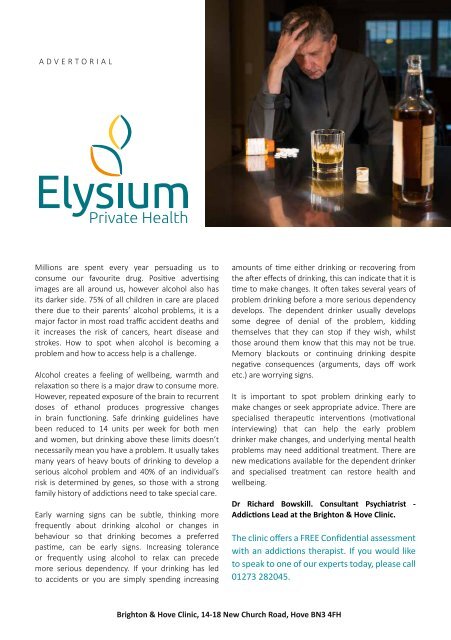Viva Brighton Issue #57 November 2017
You also want an ePaper? Increase the reach of your titles
YUMPU automatically turns print PDFs into web optimized ePapers that Google loves.
ADVERTORIAL<br />
Millions are spent every year persuading us to<br />
consume our favourite drug. Positive advertising<br />
images are all around us, however alcohol also has<br />
its darker side. 75% of all children in care are placed<br />
there due to their parents’ alcohol problems, it is a<br />
major factor in most road traffic accident deaths and<br />
it increases the risk of cancers, heart disease and<br />
strokes. How to spot when alcohol is becoming a<br />
problem and how to access help is a challenge.<br />
Alcohol creates a feeling of wellbeing, warmth and<br />
relaxation so there is a major draw to consume more.<br />
However, repeated exposure of the brain to recurrent<br />
doses of ethanol produces progressive changes<br />
in brain functioning. Safe drinking guidelines have<br />
been reduced to 14 units per week for both men<br />
and women, but drinking above these limits doesn’t<br />
necessarily mean you have a problem. It usually takes<br />
many years of heavy bouts of drinking to develop a<br />
serious alcohol problem and 40% of an individual’s<br />
risk is determined by genes, so those with a strong<br />
family history of addictions need to take special care.<br />
Early warning signs can be subtle, thinking more<br />
frequently about drinking alcohol or changes in<br />
behaviour so that drinking becomes a preferred<br />
pastime, can be early signs. Increasing tolerance<br />
or frequently using alcohol to relax can precede<br />
more serious dependency. If your drinking has led<br />
to accidents or you are simply spending increasing<br />
amounts of time either drinking or recovering from<br />
the after effects of drinking, this can indicate that it is<br />
time to make changes. It often takes several years of<br />
problem drinking before a more serious dependency<br />
develops. The dependent drinker usually develops<br />
some degree of denial of the problem, kidding<br />
themselves that they can stop if they wish, whilst<br />
those around them know that this may not be true.<br />
Memory blackouts or continuing drinking despite<br />
negative consequences (arguments, days off work<br />
etc.) are worrying signs.<br />
It is important to spot problem drinking early to<br />
make changes or seek appropriate advice. There are<br />
specialised therapeutic interventions (motivational<br />
interviewing) that can help the early problem<br />
drinker make changes, and underlying mental health<br />
problems may need additional treatment. There are<br />
new medications available for the dependent drinker<br />
and specialised treatment can restore health and<br />
wellbeing.<br />
Dr Richard Bowskill. Consultant Psychiatrist -<br />
Addictions Lead at the <strong>Brighton</strong> & Hove Clinic.<br />
The clinic offers a FREE Confidential assessment<br />
with an addictions therapist. If you would like<br />
to speak to one of our experts today, please call<br />
01273 282045.<br />
<strong>Brighton</strong> & Hove Clinic, 14-18 New Church Road, Hove BN3 4FH


















